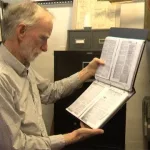
DEKALB, New York (WWNY) – For 20 years, town of DeKalb historian Bryan Thompson has been searching through extremely limited records on the African American residents of St. Lawrence County.
“It’s because no one had written about it,” said Thompson, author of African Americans in St. Lawrence County. “In the 19th century, Black people weren’t considered on equal footing with everyone else.”
Nearly all local records neglected to include information about the Black people here. One might assume there just weren’t many in the area, but that’s not true. There were religious leaders.
“There were a number of free Black ministers who preached in St. Lawrence County,” Thompson said, “mostly at the Free Will Baptist Church.”
There were also military heroes.
“That is Curtis Sneed. He came to Massena in 1915 and he was drafted into World War I and he won the Croix De Guerre, the highest military honor in France.”
And there were wealthy, influential politicians. George Swan of Potsdam owned several mills, was elected to the village council, and became the second Black man in the state to serve on a grand jury.
“The first was Frederick Douglass,” Thompson said. “The second was right here in St. Lawrence County.”
Although New York was on the right side of abolishing slavery, after the Civil War, some influential figures started changing their tune.
“The media started to run these horribly racist stories that predicted all the demeaning rumors and prejudices about Black people,” Thompson said, “and it was like they were trying to reeducate these former abolitionists. It doesn’t make you feel good, but we know things have changed and hopefully people have changed. And it makes me think my work is important to understanding Black people have always been here and are an important part of the community, and to learn from our mistakes.”
In his new book, Thompson has included census information, footnotes, and glossaries in hopes of making it easier for others to expand upon his research and further uncover the lost history of Black residents in the north country.
“We all lose something when we don’t know our own real history and it’s important to know all the little bits,” Thompson said. “In order to have a rich and valid history, we need to tell everybody’s story.”
